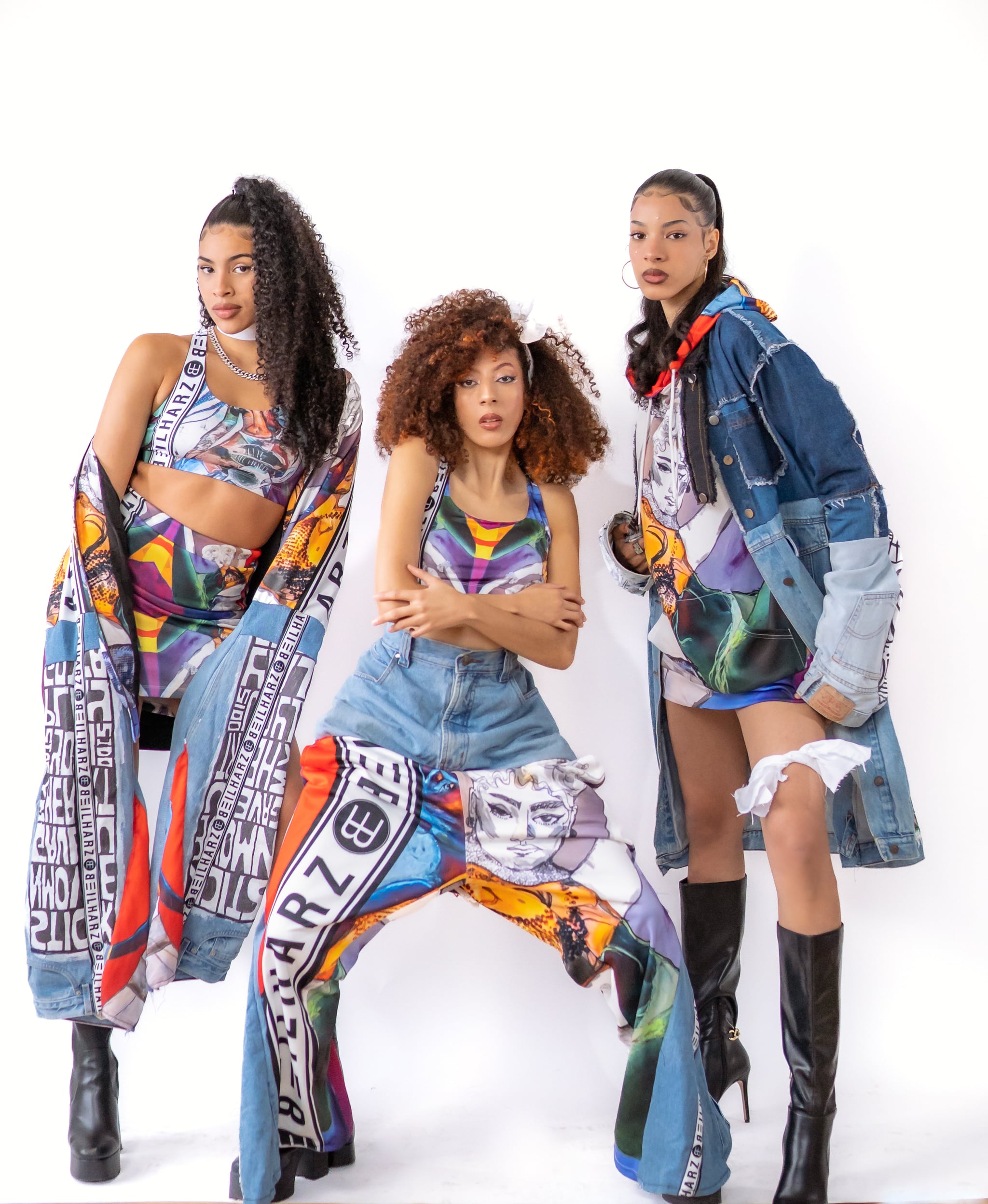
Image Source: Katelina Ecleston
For sisters Keisha, Fiona, and Fiorella Sanchez, music is something that has always been a part of their lives. “We come from a family of musicians on both sides,” Keisha, the oldest of the siblings, says. The sisters happily recall the childhood holiday shows they’d put on for their family members, singing Christmas carols in both English and in Spanish for hours on end. Yet despite putting on these jam sessions for their family members and receiving formal singing, music, and dance training, the thought of teaming up to pursue their passion never occurred to them — until the COVID-19 lockdown, that is.
“We’ve always sung together, and we would record covers and stuff, but we never said, ‘Oh, let’s make the group,’ until the pandemic because we were all locked inside and we were like, ‘Well, what do we do now,” Keisha says. And so, Musas was born. But unlike our passing obsession with banana bread, the New York-based group are more than just the product of pandemic boredom. Taking a cue from the girl groups of the ’90s and early 2000s, like TLC, Xscape, SWV, and 3LW, Musas are ready to bring their eclectic sound to the masses.
“So at the beginning, we were like, ‘Let’s just make music because we love making music.’ But then it shifted because we’re doing something that’s been done before, so we needed to figure out a way to put our essence and cultural background into it,” Keisha says.
That diverse cultural background led the Colombian-Argentinian sisters to develop a sound that draws inspiration from genres like reggaeton and salsa, as well as a wide range of artists such as Alicia Keys, Nicki Minaj, and Aretha Franklin, to name just a few. For example, their latest release, “Patience,” is an Afrobeat made in collaboration with Colombian producer DJ CrisBoy, Nigerian producers Davidace and Young D, and Colombian violinist La Lulu. Similarly, for their debut single, “Destino,” the trio tackled the emerging genre of ritmo exótico with help from one of its pioneers, Luis Eduardo Acústico.
When asked what genre they might want to incorporate next, the answer comes out without hesitation. “Drill,” Fiona, the resident rapper of the group, says. “Like not a completely drill song, but at some point just switch it up. I think that would be really cool,” she continues. She also mentions doing a reggaeton song in the future, ideally by collaborating with one of that genre’s up-and-coming artists. Of course, along with up-and-comers like themselves, the sisters also have their list of dream collabs ranging from R&B stars like Alicia Keys and Chloe x Halle to reggaetoneros like Rauw Alejandro and Bad Bunny to boundary-pushing artists like Mabiland and ChocQuibTown.
But the group’s willingness to collaborate with other musicians and producers goes beyond just a simple search for interesting genres. Identifying as Afro-Latinas, the girls use collaboration as a way to shine a light on a culture and people who have contributed so much to modern music but are often left out of more mainstream conversations.
“[We want to] give the genres and the people who came before us their flowers and celebrate Afro-diasporic beauty. That’s really what it is. It’s in our blood. Those are our roots. And if we can celebrate it, we will. That’s important to us.”
“[We want to] give the genres and the people who came before us their flowers and celebrate Afro-diasporic beauty. That’s really what it is. It’s in our blood. Those are our roots. And if we can celebrate it, we will. That’s important to us,” Keisha says. As light-skinned Afro-Latinas, Musas understand that part of their responsibility to their culture is checking their privilege in order to contribute to and highlight the achievements of their peers in a respectful way — something they felt they achieved with the video shoot for “Destino,” which featured various artists from their dad’s hometown, El Pacífico Colombiano.
[embedded content]
“All the dancers in our video, even the choreographer, they’re also from where my dad’s from. So he came up with everything to incorporate our talents but to still keep it original and fresh,” Fiona says. Their eagerness to highlight the contributions of Afro-diasporic artists and collaborators is balanced by patience (no pun intended) when it comes to their own musical journey.
“The more we develop in this industry, I think we’ll find our own spot in it and make a sound for ourselves where people will be able to recognize us.”
“The more we develop in this industry, I think we’ll find our own spot in it and make a sound for ourselves where people will be able to recognize us,” Fiorella says. However, the sisters also understand that recognition takes time, especially on the path they’ve chosen.
“We’re also a girl group. We’re not solo artists, so it’s a little bit harder as we’re in a place where there are not really a lot of people. But I think we can influence people to pursue it as well,” Fiona says. Besides being a group act trying to make it in an industry dominated by solo artists, Musas also have to contend with the same challenges that affect many women in the music business. But even if the challenges they face as a young, upstart girl group are numerous, Musas find strength in numbers and the fact that they have their sisterly bond to fall back on. And they’re confident that their vision will pay off.
“There are so many women in the industry who are so talented, and that should be the thing that shines through. But you have the people on top who can make or break you. But I think that when you have a vision and like a set goal, it’s possible to break through and make a name for yourself,” Keisha says.
In the meantime, the sisters just continue to do what they love: make music that people can vibe to and that represents their culture.
